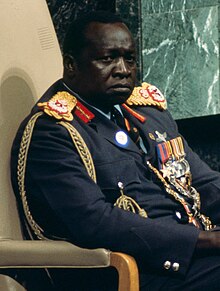
Back Idi Amin Afrikaans ኢዲ አሚን Amharic عيدي أمين Arabic عيدى امين ARZ Idi Amin AST İdi Amin Azerbaijani Idi Amin BCL Ідзі Амін Byelorussian Ідзі Амін BE-X-OLD Иди Амин Bulgarian
Idi Amin | |
|---|---|
 Amin shortly before addressing the United Nations General Assembly in 1975 | |
| 3rd President of Uganda | |
| In office 25 January 1971 – 11 April 1979 | |
| Vice President | Mustafa Adrisi |
| Preceded by | Milton Obote |
| Succeeded by | Yusuf Lule |
| Personal details | |
| Born | Awon'go Idi Amin Dada 30 May 1928 Nakasero Hill, Kampala, Uganda Protectorate |
| Died | 16 August 2003 (aged 74) Jeddah, Saudi Arabia |
| Resting place | Ruwais Cemetery |
| Spouses | At least 6, including:
Malyamu
(m. 1966; div. 1974)Kay
(m. 1966; div. 1974)Nora
(m. 1967; div. 1974)Madina
(m. 1972, died) |
| Children | 43 (claimed)[1] |
| Relatives | |
| Signature |  |
| Military service | |
| Allegiance |
|
| Branch/service |
|
| Rank |
|
| Commands | Commander-in-Chief of the Uganda Army |
| Battles/wars | |
Idi Amin Dada Oumee (/ˈiːdi ɑːˈmiːn, ˈɪdi -/ ⓘ, UK also /- æˈmiːn/; 30 May 1928 – 16 August 2003) was a Ugandan military officer and politician who served as the third president of Uganda from 1971 to 1979. He ruled as a military dictator and is considered one of the most brutal despots in modern world history.[2]
Amin was born to a Kakwa father and Lugbara mother. In 1946, he joined the King's African Rifles (KAR) of the British Colonial Army as a cook. He rose to the rank of lieutenant, taking part in British actions against Somali rebels and then the Mau Mau Uprising in Kenya. Uganda gained independence from the United Kingdom in 1962, and Amin remained in the army, rising to the position of major and being appointed commander of the Uganda Army in 1965. He became aware that Ugandan President Milton Obote was planning to arrest him for misappropriating army funds, so he launched the 1971 Ugandan coup d'état and declared himself president.
During his years in power, Amin shifted from being a pro-Western ruler enjoying considerable support from Israel to being backed by Libya's Muammar Gaddafi, Zaire's Mobutu Sese Seko, the Soviet Union, and East Germany.[3][4][5] In 1972, Amin expelled Asians, a majority of whom were Indian-Ugandans, leading India to sever diplomatic relations with his regime.[6] In 1975, Amin became the chairman of the Organisation of African Unity (OAU), a Pan-Africanist group designed to promote solidarity among African states.[7] Uganda was a member of the United Nations Commission on Human Rights from 1977 to 1979.[8] The United Kingdom broke diplomatic relations with Uganda in 1977, and Amin declared that he had defeated the British and added "CBE" to his title for "Conqueror of the British Empire".[9]
As Amin's rule progressed into the late 1970s, there was increased unrest against his persecution of certain ethnic groups and political dissidents, along with Uganda's very poor international standing due to Amin's support for PFLP-EO and RZ hijackers in 1976, leading to Israel's Operation Entebbe. He then attempted to annex Tanzania's Kagera Region in 1978. The Tanzanian president Julius Nyerere ordered his troops to invade Uganda in response. Tanzanian Army and rebel forces successfully captured Kampala in 1979 and ousted Amin from power. Amin went into exile, first in Libya, then Iraq, and finally in Saudi Arabia, where he lived until his death in 2003.[10]
Amin's rule was characterised by rampant human rights abuses, including political repression, ethnic persecution, extrajudicial killings, as well as nepotism, corruption, and gross economic mismanagement. International observers and human rights groups estimate that between 100,000[11] and 500,000 people were killed under his regime.[9]
- ^ Nakajubi, Gloria (15 July 2015). "Ugandan dictator Idi Amin's widow Sarah Kyolaba dies in the UK aged 59". The Independent. Archived from the original on 25 September 2015. Retrieved 21 September 2015.
- ^ Boddy-Evans, Alistair. "Biography of Idi Amin, Brutal Dictator of Uganda". ThoughtCo. Archived from the original on 16 July 2019. Retrieved 16 July 2019.
- ^ Roland Anthony Oliver, Anthony Atmore (1967). "Africa Since 1800". The Geographical Journal. 133 (2): 272. Bibcode:1967GeogJ.133Q.230M. doi:10.2307/1793302. JSTOR 1793302.
- ^ Dale C. Tatum. Who influenced whom?. p. 177.
- ^ Gareth M. Winrow. The Foreign Policy of the GDR in Africa, p. 141.
- ^ Subramanian, Archana (6 August 2015). "Asian expulsion". The Hindu.
- ^ "Idi Amin: A Byword for Brutality". News24. 21 July 2003. Archived from the original on 5 June 2008. Retrieved 13 February 2012.
- ^ Gershowitz, Suzanne (20 March 2007). "The Last King of Scotland, Idi Amin, and the United Nations". Archived from the original on 6 June 2009. Retrieved 8 August 2009.
- ^ a b Keatley, Patrick (18 August 2003). "Idi Amin". The Guardian. Archived from the original on 27 July 2013. Retrieved 16 March 2020.
- ^ "Dictator Idi Amin dies". 16 August 2003. Archived from the original on 9 March 2021. Retrieved 10 May 2020 – via news.bbc.co.uk.
- ^ Ullman, Richard H. (April 1978). "Human Rights and Economic Power: The United States Versus Idi Amin". Foreign Affairs. 56 (3): 529–543. doi:10.2307/20039917. JSTOR 20039917. Archived from the original on 18 April 2015. Retrieved 24 October 2018.
The most conservative estimates by informed observers hold that President Idi Amin Dada and the terror squads operating under his loose direction have killed 100,000 Ugandans in the seven years he has held power.
© MMXXIII Rich X Search. We shall prevail. All rights reserved. Rich X Search